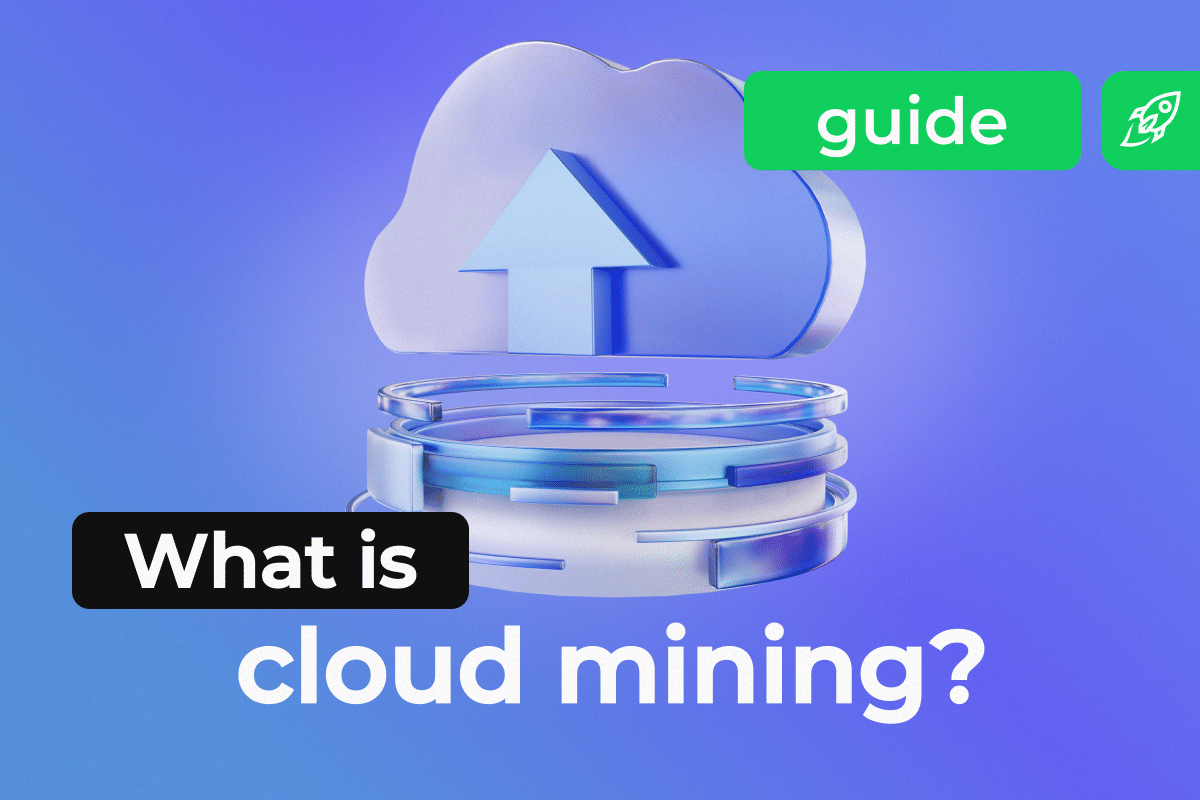In my journey through the dynamic world of the crypto industry, I’ve witnessed a significant shift in how the mining of cryptocurrencies is approached. Long gone are the days when one needed hefty rigs humming away in their basements to be a part of this revolution. Now, with the advent of cloud mining, participating in the cryptocurrency gold rush — or should I say the ‘mining season’ — has become more accessible than ever.
If you, like me, are intrigued by the decentralized world of digital currencies but are hesitant about the complexities and costs, this article will shed light on the cloud-based process of mining cryptocurrency. Join me as we dive deep into this fascinating alternative, exploring its nuances, potential returns, and challenges.
What Is Cloud Mining?
Cloud mining offers individuals the opportunity to participate in the cryptocurrency mining process without the direct need for mining hardware, software, electricity, or other resources. Essentially, cloud mining is a service where you contract or rent the mining capacity of a company that has its own data centers dedicated to cryptocurrency mining.
Imagine it this way: instead of setting up a large cryptocurrency mining rig in your garage, consuming power and producing heat, you hire a dedicated space from a company. This company manages all the complexities of the mining process on your behalf. You’re essentially renting a slice of their entire setup. This method allows you to engage in the crypto mining world without dealing with the challenges of setup, maintenance, and direct costs. It brings the mining process to a broader audience, eliminating technical barriers and reducing upfront investments.
However, like all investment opportunities, cloud mining is not without its risks. As the cryptocurrency world is known for its volatility, potential miners need to conduct thorough research and perform due diligence before jumping in. Moreover, ensuring that you’re partnering with a reputable cloud mining service is essential, as there have been instances of fraudulent schemes in the past.
Types of Cloud Mining
If you are considering trying cloud mining, it is crucial to understand its varied forms. The industry primarily offers three types:
Hosted Mining
In this model, you lease or purchase a mining machine, but it remains at the service provider’s facility. The company provides maintenance; you pay for the machine and the hosting fee. Since you own the hardware, you have more control. Yet, this also requires more hands-on oversight.
Virtual Hosted Mining
This method involves creating a virtual private server and installing your own mining software. It’s a more DIY approach where you control the mining process through a virtual instance, but you’re still leveraging the infrastructure of a third-party service. This type is for those who wish to have more control over their mining but don’t want to manage physical hardware.
Leased Hashing Power
Arguably the most popular form of cloud mining. Here, you lease a certain amount of hashing power without the need for a dedicated virtual or physical computer. It’s the most hands-off approach. You’re essentially renting computational power (usually) specified in hashes per second. The more power you lease, the more significant the portion of the mining rewards you can claim.
How Does Cloud Mining Work?
Cloud mining operates on a fairly straightforward principle. Instead of investing in your own mining rigs, you purchase cloud mining contracts from a cloud mining company. These contracts allow you to rent computing power or hash power from their mining farm — a collection of specialized mining equipment. This hash power determines how much of the mining power you hold in the larger scheme. Higher hash power means you have a better chance of solving the complex mathematical problems required to earn cryptocurrencies.
The cloud mining provider is responsible for maintaining the hardware, covering electricity costs, and managing the intricacies of mining pools. These companies have the technical infrastructure and expertise to optimize the hash rate and ensure the process runs smoothly. Essentially, you’re leveraging their technical knowledge and specialized mining equipment without getting into the nitty-gritty of the operation. Some providers even have a mobile app for you to monitor your earnings and hash rate in real time.

The Risks and Advantages of Cloud Mining
Navigating the world of Bitcoin cloud mining and other cryptocurrency mining services has its perks and pitfalls.
The Benefits of Cloud Mining
Simplicity: No need to have technical expertise or invest in expensive and complex mining setups.Convenience: With cloud mining services, users can bypass issues like electricity consumption, hardware maintenance, or noise.Accessibility: Platforms often offer mobile apps or web interfaces, enabling users to monitor and manage their contracts from anywhere.
The Challenges of Cloud Mining
Trustworthiness: As with any investment, it’s vital to make sure you’re dealing with a reputable cloud mining service provider. Scams have been reported in the past.Profitability: Fluctuations in cryptocurrency values, changes in mining difficulty, and contract terms can affect potential earnings.Lack of Control: Unlike owning your own mining rigs, cloud mining doesn’t give you full control over the mining process.
How to Start Cloud Mining
Venturing into cloud mining begins with research. First, identify reputable cloud mining companies. Platforms like Genesis Mining have established themselves as trustworthy entities in the Bitcoin cloud mining space, but there are several others to consider.
Choose Your Provider. After identifying a reliable cloud mining service provider, create an account. This will give you access to details about available contracts, costs, and potential returns.Select a Contract. Providers offer different cloud mining contracts based on factors like duration, hash power, and type of cryptocurrency. For instance, while Bitcoin mining is popular, some might prefer to mine altcoins.Monitor Your Progress. Once you’ve purchased your contract, the mining process begins. Depending on the provider, you might be able to monitor your progress, hash rate, and earnings through a mobile app or web interface.Withdraw Earnings. After accumulating enough cryptocurrency, you can withdraw it to your digital wallet. Remember, while the potential for profit exists, always stay updated on market trends and contract terms.
Top 5 Best Cloud Mining Platforms
In the ever-evolving realm of mining cryptocurrency, selecting the right platform is a pivotal step in ensuring profitability and security. As the interest in mining Bitcoin and other cryptocurrencies has surged, a plethora of cloud mining options have cropped up across the digital landscape. It’s essential to navigate these options wisely to avoid pitfalls and maximize potential returns. Here are the top 5 best cloud mining platforms that have garnered respect and a reliable reputation among crypto enthusiasts.
Genesis Mining
Often hailed as one of the most trusted cloud mining sites, Genesis Mining offers a wide array of cloud mining contract options for various blockchain networks. Renowned for transparency and reliability, it provides a clear understanding of how their mining farms operate. Plus, the platform has features like a daily payout, ensuring that users can access their earnings swiftly.
Hashflare
This platform offers a diverse type of mining, catering to those looking to mine Bitcoin, Ethereum, and more. Their user-friendly dashboard allows for real-time monitoring, and they pride themselves on transparency, giving users clear insights into their contract details and potential returns.
HashNest
Operated by Bitmain, one of the leading producers of Bitcoin mining hardware, HashNest has the pedigree to back its operations. It provides users the flexibility to choose from a range of contracts and cryptocurrencies. Their unique selling point is the ability for users to trade hash rates on the platform, introducing a new dimension to the crypto mining sites arena.
MinerGate
Recognized for its intuitive interface, MinerGate allows users to mine multiple cryptocurrencies simultaneously. This platform is ideal for beginners venturing into digital currency mining, boasting comprehensive guides and 24/7 support. With its versatile offerings, users can experiment and find the cryptocurrency that gives them the best returns.
Eobot
Established in 2013, Eobot stands as one of the oldest cloud mining platforms. Its longevity speaks of its reliability and trustworthiness in the industry. With a straightforward approach, users can mine various cryptocurrencies and even set up mining pools to boost their potential earnings.
While these platforms rank among the best in the industry, it’s always recommended to conduct personal research before committing. The world of mining cryptocurrencies is dynamic, and what might be a profitable venture today could change tomorrow. Stay informed, stay updated, and always prioritize security when diving into the realm of cloud mining.
FAQ
Is cloud mining profitable?
The profitability of cloud mining largely hinges on various factors, including the fluctuation in cryptocurrency prices, the efficiency of the cloud mining service, and current operational costs. Traditional crypto mining with powerful computers often involves substantial upfront investments and ongoing expenses, like electricity. Cloud mining offers a way to bypass these costs, but it requires prospective miners to pay fees for the service they’ve signed a contract with.
While one can benefit from the processing power of the largest mining pools via cloud mining, it’s essential to account for these fees when calculating potential mining revenue. Additionally, market volatility and ever-increasing mining difficulty can impact profitability. Hence, while cloud mining can be profitable, it’s crucial to stay informed, choose reputable services, and be aware of the market dynamics to ensure a positive return on investment.
What is Bitcoin cloud mining?
When engaging in Bitcoin cloud mining, individuals validate Bitcoin transactions and add them to the blockchain without having to own and maintain physical mining hardware. Instead, they rent or buy computing power from a cloud mining service provider. This eliminates the need for personal equipment, electricity costs, and technical know-how.
Some cloud mining services also offer merged mining, allowing users to mine two or more cryptocurrencies simultaneously, potentially increasing their mining revenue. Essentially, Bitcoin cloud mining democratizes the mining process, making it accessible to a broader audience who wish to mine Bitcoin without managing the complexities of traditional mining setups.
What do you need to start cloud mining?
Starting cloud mining is relatively straightforward compared to traditional mining methods. First and foremost, you’ll need a cryptocurrency wallet to store your earnings. Next, research and select a reputable cloud mining service. Given the myriad of options available, it’s pivotal to prioritize services with a good track record, transparent fee structures, and strong user reviews. Once you’ve chosen a provider, you can purchase a cloud mining contract that defines the terms of your arrangement, such as the duration and the amount of processing power you’re renting.
While you don’t need powerful computers or an in-depth understanding of the technical aspects of mining, it’s beneficial to have basic knowledge of how mining works and the associated risks. Lastly, always stay updated with the cryptocurrency market trends and changes to maximize your mining endeavors.
Disclaimer: Please note that the contents of this article are not financial or investing advice. The information provided in this article is the author’s opinion only and should not be considered as offering trading or investing recommendations. We do not make any warranties about the completeness, reliability and accuracy of this information. The cryptocurrency market suffers from high volatility and occasional arbitrary movements. Any investor, trader, or regular crypto users should research multiple viewpoints and be familiar with all local regulations before committing to an investment.



